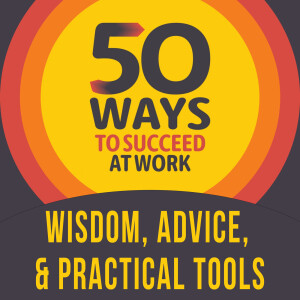

Hello, I'm Andrew, and this is Series 3 of the weekly podcast, 50 Ways to Succeed at Work. These podcasts build confidence and know-how, helping you achieve happiness at work. By the way, that's also the title of my book, available at Amazon and from the book's website, My Happiness at Work.
Now for today's episode in Series 3. This is episode 36, titled Ball Juggler--unraveling the paradox of multi-tasking. This morning, Jess is finalizing a report for his manager. He also answers a flood of calls from needy colleagues, prepares for a team session this afternoon, and jots down some notes for next week's client presentation.
Due to his diligent approach, Jess completes all of these tasks within the deadlines on his current to-do list. But which activities do you guess Jess does well, and which fall just short of the standard he likes to achieve?
In a work environment like Jess's, there's considerable pressure to juggle multiple tasks simultaneously. From managing projects to responding to emails, attending meetings, and handling client requests, it often feels like he's working to keep several balls in the air. This skill is a critical factor in his success at work. But how crucial is it to be a skilled ball juggler?
Multi-tasking holds a paradox at its heart. The more tasks you manage simultaneously, the more productive you theoretically become. However, there's solid evidence that doing several things simultaneously, or switching back and forth, produces poor results.
Our brains are more designed to focus on one thing at a time. This constant switching increases brain strain, making it harder to focus intensely on any one task, leading to a shallower understanding and reduced creativity.
Another concern with being a ball juggler at work is that you're more liable to make errors. Constantly shifting gears can be mentally exhausting.
Over time, this stress can lead to burnout and decreased well-being. Each time we switch tasks, we pay a cognitive price for refocusing. These switching costs add up and damage overall performance.
To unravel the paradox of multi-tasking, it's best to block out chunks of time rather than attempt to do them in combination with others.
Or you can divide tasks into particular ones that can be manipulated to navigate this paradox effectively. Solving the paradox is not about doing more tasks simultaneously. It's about doing the right ones with intention and focus.
Here are some tips for aspiring jugglers: Aim to reduce your cognitive load, group similar tasks together, fight attention fragmentation, and reduce strain from constant context switching.
Watch out for signs of stress and burnout. Create a to-do list and prioritise tasks based on urgency and importance. Try mindfulness to help you stay present in the moment.
And my final thoughts on this? Being a ball juggler isn't about circus tricks. It's about unravelling the paradox of multitasking. Embrace juggling to demonstrate your capability, adaptability, and efficiency.
And remember, it's not about how many balls you juggle, but how well you keep them in motion.
You've been listening to an episode of Series 3 of my weekly podcast, 50 Ways to Succeed at Work. You can hear the other podcasts at the 50ways.site. Also, check out my book, Happiness at Work. Join me next week for another unmissable episode in Series 3. Bye for now.
No comments yet. Be the first to say something!